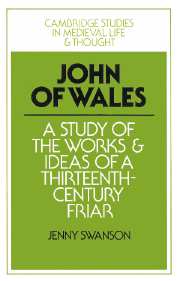Book contents
- Frontmatter
- Contents
- Acknowledgements
- List of Abbreviations
- Introduction
- 1 The career of John of Wales
- 2 The works of John of Wales: sources and technique
- 3 The Breviloquium de Virtutibus Antiquorum Principum et Philosophorum
- 4 Communiloquium, part 1: John of Wales on the state and its members
- 5 Communiloquium, parts 2 and 3: John of Wales on secular society
- 6 Communiloquium, parts 4–7: John of Wales on scholars and churchmen
- 7 Philosophers and saints: the Compendiloquium and Breviloquium de Sapientia Sanctorum of John of Wales
- 8 The works of John of Wales: spread and influence
- Conclusion
- Appendices
- 5 Checklist of early printed editions of works by John of Wales
- Bibliography
- Index
5 - Communiloquium, parts 2 and 3: John of Wales on secular society
Published online by Cambridge University Press: 23 September 2009
- Frontmatter
- Contents
- Acknowledgements
- List of Abbreviations
- Introduction
- 1 The career of John of Wales
- 2 The works of John of Wales: sources and technique
- 3 The Breviloquium de Virtutibus Antiquorum Principum et Philosophorum
- 4 Communiloquium, part 1: John of Wales on the state and its members
- 5 Communiloquium, parts 2 and 3: John of Wales on secular society
- 6 Communiloquium, parts 4–7: John of Wales on scholars and churchmen
- 7 Philosophers and saints: the Compendiloquium and Breviloquium de Sapientia Sanctorum of John of Wales
- 8 The works of John of Wales: spread and influence
- Conclusion
- Appendices
- 5 Checklist of early printed editions of works by John of Wales
- Bibliography
- Index
Summary
In the second part of Communiloquium, John discusses the bonds of society by focussing on different relationships: masters and servants, parents and children, and so on. In the third he re-divides the population a number of times according to the differences in their status, and admonishes the groups accordingly. He classifies his differences into two groups, naturalia (natural) — for example, men and women, young and old — and contingentia (contingent) — for example, spinsters and widows — before listing those he intends to discuss. First he takes the two sexes, then the different stages of life from infancy to old age. Thirdly, he turns to different conditions — noble and ignoble — and, fourthly, to differing amounts of natural gift, whether spiritual or corporeal. Fifthly, he lists the differences pertaining to the quality of life — that is, between sinners and penitents — and, sixthly, differences in position — that is, between spinsters, married women and widows. His seventh division is based upon poverty and wealth, and his eighth encompasses such pairs of opposites as adversity and prosperity, sickness and health.
The range of these groupings is considerable. Not only are they independent of those used to analyse the state, but the categories are not mutually exclusive.
- Type
- Chapter
- Information
- John of WalesA Study of the Works and Ideas of a Thirteenth-Century Friar, pp. 107 - 141Publisher: Cambridge University PressPrint publication year: 1989



